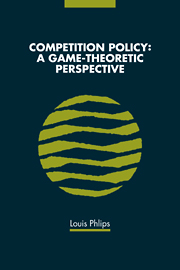12 - Evidence on predation
Published online by Cambridge University Press: 23 September 2009
Summary
In the previous chapter, I asked whether predation is a theoretical possibility. In this chapter, I search for empirical evidence on predatory pricing, using the conclusion of the theory (in particular the five necessary conditions for predatory pricing) as a guideline. Four sources of evidence will be discussed. The potentially most interesting source is of an experimental nature. It asks whether predatory pricing is an observable phenomenon that can be induced in a laboratory environment. Its interest stems from the fact that a direct link with economic theory can be established by imposing a set of structural features that are favourable to the emergence of predatory pricing on theoretical grounds. I then move to an overview of American antitrust litigation, to get an idea of the relative importance of the number of cases of alleged predation brought before court, knowing that predation claimed is not predation proved. In section 12.3, direct evidence is gathered by analysing a few historical cases that are referred to in the literature. In section 12.4, a modelling approach, based on the theory developed in chapter 11, shows how the presence or absence of predation can be inferred for a particular market, namely the market for bus services in a particular town.
Experimental evidence
Experimental games have provided new insights in the working of industrial markets.
- Type
- Chapter
- Information
- Competition PolicyA Game-Theoretic Perspective, pp. 206 - 229Publisher: Cambridge University PressPrint publication year: 1995



